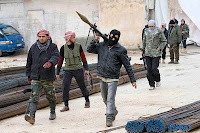Monday, October 15, 2012
Stalemates and Tipping Points
As
Turkish artillery fire responds in kind to a Syrian mortar attack on a Turkish
border village, as massive explosions and car bombs take their toll in big
cities with big government targets, the world outside expects a rapid end to
hostilities as the Assad regime crumbles under the incessant battles, withering
rear-guard attacks, continued defections, economic paralysis and diminishing
resources. But upon closer examination, the war(s) in Syria are anything but
clearly tilting in favor of one side or the other. Despite virtual global
condemnation, support from Iran and Russia has sustained the brutal dictator,
and a change in tactics may have reduced the continuing threat from one area
where rebels need “more.” Defections from trained
soldiers.
To
win wars, you need competent soldiers and military hardware. With the United
Nations sitting on the sidelines, de-powered by continuing Security Council
vetoes from Russia and China, the rebels have pretty much been left to fend for
themselves. They have relied heavily on massive defections from government
troops, who brought their skills and weapons with them. Sensitive to this
process, the Syrian leadership has changed its strategy, putting fewer of its
soldiers in direct contact with civilians likely to have rebel sympathies,
choosing instead to use its long-range artillery and air superiority to cleanse offending towns and
neighborhoods. This reduces the contacts from house-to-house fighting,
neighborhood invasions, where soldiers have to confront innocent civilians and
their once-fellow soldiers who have already changed sides begging their comrades
to defect.
Indiscriminate
car bombings, favored by extremists in the rebel ranks, also alienate civilians
who inevitably get caught in the fray. For an increasing segment of Syria, they
just want it all to go away… they just want to be left alone to live their lives
without fear and with the normal government services and infrastructure intact
and in service. Syrian leaders have also moved their most loyal troops to the
checkpoints to reduce the possibility of getting messages back and forth to
potential defectors or “spies” still in government ranks. Defectors also have to
deal with the ramifications of their families who remain behind, well within
Syrian-government-controlled boundaries.
“[N]ow
opposition commanders say defections have slowed to a trickle. Some commanders
have given up trying to entice defectors, and others have resorted to more
desperate measures: cajoling, duping, threatening and even drugging and
kidnapping military men to get them to change sides, or at least stay out of the
fight. Without defections, they say, the opposition cannot hope to grow, never
mind prevail… ‘We use means only used by the devil,’ said Ahmed Qunatri, a rebel
commander in northern Syria
who defected from the Republican Guard…
“Some rebel commanders now fret that all the soldiers who
were inclined to defect already have. The rest remain loyal to the government,
or are terrified of betraying it. Others are just suspicious of an armed
movement that has found extremists among its ranks. A suicide attack in Aleppo
on [October 3rd] that killed more than 40 people and devastated a
government-held district drew widespread anger. Aware of just how much the
violence is undermining popular support for the uprising, some rebel groups
immediately tried to blame the government for staging the bombing. The
government blamed the rebels. By nightfall, Jabhet al-Nusra, an insurgent group
affiliated with Al Qaeda, claimed responsibility for the suicide bombings.”
New
York Times, October 3rd.
If
this trend continues, and if the outside world sits idly by hoping for change,
several possibilities loom with ugly potential. First, this just becomes a
long-standing civil war without any near-term solutions. Second, as the
less-than-cohesive rebel factions begin to disagree on tactics and the end-game
(so far, they have been willing to accept deals with the devil just to get Assad
out), they may just turn on each other.
Popular
sentiments, voiced by people just plain tired of war, may increasingly accept
the continued reign of the brutal Assad government just to allow their lives to
regain some semblance of stability and normalcy. In case you wondered why Assad
doesn’t just step down and go live in some swanky palace in a friendly nation.
We need to question exactly whose side time favors as the war rages on. And if
indeed Assad remains in power – or at least his Alawite elite – how exactly does
the rest of the world treat this rogue nation that has slaughtered so many of
its own people? And if the world doesn’t like that possibility, then exactly
what has to happen, and who has to do it?! And when?
I’m Peter Dekom, and happy endings
are often relegated to mythology and fairy tales.
Subscribe to:
Post Comments (Atom)






No comments:
Post a Comment